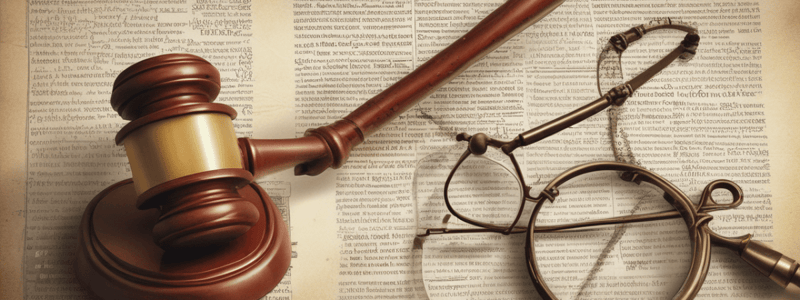Podcast
Questions and Answers
What is the main purpose of the Chain of Custody?
What is the main purpose of the Chain of Custody?
- To prove the credibility of the witness
- To detect changes to the testimonial evidence
- To prevent the destruction of the original evidence
- To ensure that the evidence presented is the same as the evidence seized (correct)
What is the Best Evidence Rule designed to prevent?
What is the Best Evidence Rule designed to prevent?
- The destruction of the original evidence
- The loss of the original document
- The introduction of hearsay evidence
- Changes to the testimonial evidence contained in the document (correct)
What is the main reason why hearsay evidence is generally inadmissible?
What is the main reason why hearsay evidence is generally inadmissible?
- Because it is an out-of-court statement
- Because it depends on the credibility of a person other than the witness (correct)
- Because it is not relevant to the case
- Because it is a written statement
What is the purpose of the evidence entered into a court?
What is the purpose of the evidence entered into a court?
What is the term for the original of a piece of documentary evidence?
What is the term for the original of a piece of documentary evidence?
What is the term for the rule of evidence that states that hearsay is generally inadmissible?
What is the term for the rule of evidence that states that hearsay is generally inadmissible?
What is the primary purpose of the Exclusionary Rule?
What is the primary purpose of the Exclusionary Rule?
What is the term for evidence that is derived from evidence obtained by an illegal search or interrogation?
What is the term for evidence that is derived from evidence obtained by an illegal search or interrogation?
What is the purpose of the Hearsay Rule in trials?
What is the purpose of the Hearsay Rule in trials?
What is the requirement for one-on-one confrontations in eyewitness identification?
What is the requirement for one-on-one confrontations in eyewitness identification?
What is the exception to the Exclusionary Rule that allows evidence obtained illegally to be used in trial if it was obtained in good faith?
What is the exception to the Exclusionary Rule that allows evidence obtained illegally to be used in trial if it was obtained in good faith?
What is the term for the method used to identify a suspect when the suspect is known, but is not in custody?
What is the term for the method used to identify a suspect when the suspect is known, but is not in custody?
What is the purpose of the Exclusionary Rule exceptions?
What is the purpose of the Exclusionary Rule exceptions?
What is the requirement for a police officer to testify as a witness?
What is the requirement for a police officer to testify as a witness?
What is the term for the rule of evidence that states that any evidence obtained by illegal means must be excluded from the trial?
What is the term for the rule of evidence that states that any evidence obtained by illegal means must be excluded from the trial?
What is the purpose of the relative suggestiveness of the method used in eyewitness identification?
What is the purpose of the relative suggestiveness of the method used in eyewitness identification?
Flashcards are hidden until you start studying
Study Notes
Evidence and Chain of Custody
- Evidence refers to testimony or items entered into a court to prove an issue or support an action.
- Chain of Custody is the accounting of the whereabouts of a piece of physical evidence from its seizure until its introduction into court as evidence, to prove that the item presented is the same as the item seized.
Best Evidence Rule
- The Best Evidence Rule states that the original of a piece of documentary evidence must be entered as evidence, instead of a copy, unless it can be shown that the original was lost or destroyed through no fault of the party offering it.
- This rule is designed to prevent changes to the testimonial evidence contained in the document which could not be detected.
Hearsay and Hearsay Rule
- Hearsay refers to testimonial or written evidence of an out-of-court statement entered as evidence for the purpose of proving the content of the statement.
- The Hearsay Rule states that hearsay is generally inadmissible because it depends on the credibility of a person other than the witness.
- Hearsay may be used in every step of the information gathering process, and may be used as part of the probable cause needed to arrest or search, but may not be used in trial unless it falls under one of the exceptions to the Hearsay Rule, or unless the original source of the information testifies.
- Any time a police officer is acting as a witness to prove the content of the report, it is hearsay, whether it falls under an exception to the Hearsay Rule or not.
Eyewitness Identification
- The relative suggestiveness of the method used (and whether it was appropriate to the circumstances) and how suggestively that identification method was employed, is a key factor in eyewitness identification.
- There are three types of identification methods:
- Lineups: when the suspect or defendant is in physical custody.
- Photo Spreads: when the suspect is known, but is not in custody.
- One-on-one confrontations: when the suspect is detained.
- Two specific requirements for one-on-one confrontations are:
- Make the one-on-one confrontation no more than a few minutes after the commission of the crime.
- Allow no coaching of the witness.
Exclusionary Rule
- The Exclusionary Rule is a rule of evidence which states that any evidence which is obtained by illegal means must be excluded from the trial.
- It is the remedy for the Fourth, Fifth, and Sixth Amendment rights.
- There are a few exceptions to this rule, including:
- Good faith
- Independent source
- Inevitable discovery
- Impeachment exceptions.
Fruit of the Poisonous Tree Doctrine
- The Fruit of the Poisonous Tree Doctrine states that evidence which is derived from evidence which was obtained by an illegal search or interrogation must generally be excluded from use in a trial.
- The original piece of evidence will be excluded by the Exclusionary Rule; the evidence found as a result of the original evidence is excluded by Fruit of the Poisonous Tree.
- The Exclusionary Rule and Fruit of the Poisonous Tree Doctrine are intended to remedy Fourth, Fifth, and Sixth Amendment violations by punishing police officers who ignore their provisions.
Studying That Suits You
Use AI to generate personalized quizzes and flashcards to suit your learning preferences.




